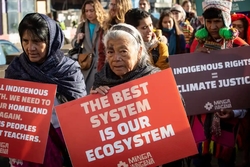Growing rush for land is destroying ecosystems and disrupting lives to satisfy global demand for goods, study warns
Businesses and governments must stop the growing rush of commodities-driven land grabbing, which is “trashing” the environment and displacing people, says new research.
Palm oil and cobalt were extreme risks for land grabs according to an analysis of 170 commodities by research firm Verisk Maplecroft published last week. It also warned that, alongside cobalt, other minerals used for “clean” technology, including silicon, zinc, copper, were high risk and undermined the sector’s label.
The research showed that goods such as coconuts, garlic, tea and cocoa were also high risk for land grabbing.
In 2007, a world food price crisis led to a land rush as companies tried to secure production and costs. A UN report in September said commodity exports in the decade after grew 20%, to $4.38tn (£3.27tn) by 2019.
Verisk Maplecroft said the demand for more land to produce goods had been accompanied by displacement of indigenous communities and damage to natural capital – “such as clean air and water, pollinating insects, and soil quality” – crucial to battling the climate crisis.
Will Nichols, Verisk Maplecroft’s head of environmental research, said investors should scrutinise supply chains and pressure companies they work with to do more.
“There is a lot of money to be made from trashing the environment rather than saving it when you are a landowner or someone looking to invest in these kinds of industries and you’re aware that the government isn’t going to stand in your way,” said Nichols.
“The onus falls on corporations to be diligent about where they are sourcing, auditing suppliers, making sure commodities are coming from where they are told they are coming from.”
Nichols added that governments were responsible for enforcing regulations and eliminating corruption.
Campaign group Focus on the Global South published a letter signed by 257 organisations last Tuesday rejecting carbon-offsetting pledges from corporations and warning that initiatives such as tree planting will displace indigenous populations while land is still exploited for industrial agriculture.
Despite world leaders agreeing to stop deforestation at Cop26 this month, Ward Anseeuw, at the International Land Coalition, said there was a gap between government pledges and action on the ground.
Anseeuw highlighted Madagascar, where he said a new land law voted in this year by parliament actually reversed efforts to allow poorer farmers to secure land rights. He said the law would strip away land rights handed out since 2005.
“It gives government very strong central power over these lands and they can decide unilaterally what can happen. That opens up the door for a huge land grab. More than 3 million households could be affected,” he said. “It really shows the contradiction of what is being discussed, and the actions or decisions being taken at a global level, and what is going on in the field with governments and specific companies.”
Land Matrix, which monitors land deals globally, said in a September report that an increase in land acquisitions starting in 2008 had peaked, but there was potential for a new land rush as economies try to recover from the Covid pandemic, with countries like India and Indonesia opening up their land markets.
Kirtana Chandrasekaran, a programme coordinator at Friends of the Earth, said agribusiness was driving land grabs.
“There is a huge connection. In Indonesia, for example, there are several million hectares that have been grabbed from small-scale producers. Sometimes they do produce some palm oil for their own consumption but the problem is when it becomes needed for high-scale production for export,” said Chandrasekaran.
“You see huge lands rights violations, where people are completely thrown off land and or harassed and threatened.”
She said displacement often affected indigenous people who are key to protecting biodiversity.
Chandrasekaran said the increasing production of commodities was driven not by demand but by companies’ desire to lower prices, as well as trade agreements, such as the EU’s proposed deal to import beef from South America.
She said this drive for commodities was despite most of the world’s food being produced by family farms, not by big corporations.
“People are still consuming things that are produced locally by small-scale producers. Commodities production can be considered food, but it’s highly processed, not accessible outside urban centres and not very nutritious,” she said.













